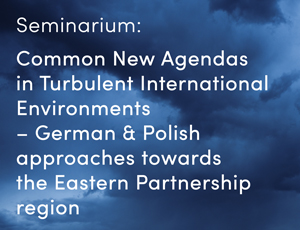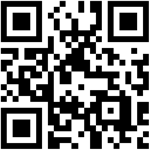
W imieniu organizatorów: prof. dr Andrei Gawrich z Uniwersytetu Justus Liebig w Giessen oraz prof. Magdaleny Góry z Instytutu Studiów Europejskich UJ zapraszamy do udziału w seminarium online "Common New Agendas in Turbulent International Environments – German & Polish approaches towards the Eastern Partnership region" .
Seminarium odbędzie się w poniedziałek, 18 marca, w godz. 9.00-15.45.

Do spotkania można dołączyć wchodząc na Zoom tutaj.
Meeting-ID: 691 8682 7972
Kenncode: 733558
Program seminarium:
Welcome Remarks
9:00 – 9.20
Welcome & Introduction
- Dr hab. Magdalena Góra, Prof. UJ, Jagiellonian University
- Prof. Dr Andrea Gawrich, Justus Liebieg University in Gissen
Session I: German-Polish Relations & Challenges in Eastern Europe
9:20 – 10:15
Topic: Opening Speech
Speaker:
- Dr Marzenna Guz-Vetter, member of Team Europe Direct and former director of the European Commission Representation in Poland
Discussant:
- Bastian Sendhardt, German Institute of Polish Affairs
Chair:
- Prof. Dr Andrea Gawrich, Justus Liebieg University in Gissen
10:15 – 10:30 Break:
Session II: Round Table: Restarting Polish-German Cooperation on EaP & the Enlargement?
10:30 – 11:45
- Dirk Schuebel, EU Special Envoy for the Eastern Partnership
- Wojciech Przybylski, Visegrad Insight, Warsaw
- Małgorzata Kopka-Piątek, Head of the European and Migration Policy Programme in the Institute of Public Affairs
Chair:
- Ilona Poselużna, M.A., Jagiellonian University
11:45 – 12:30 Lunch Break
Session III: Politicisation of EaP: The Cases of Germany & Poland
12:30 – 13:45
Paper 1: Politicisation of the EaP in the German Discourse
- Prof. Dr Andrea Gawrich, Justus Liebieg University in Gissen
- Maraike Nicole Vandergrift, M.A., Justus Liebieg University in Gissen
Paper 2: Politicisation of the EaP in the Polish foreign policy? The impact of Russian aggression on Ukraine.
- Dr hab. Magdalena Góra, Prof. UJ, Jagiellonian University
- Volodymyr Posviatenko, M.A., Jagiellonian University
Discussant:
- Prof. Karolina Pomorska, Leiden University
Chair:
- Dr Jan Grzymski, Jagiellonian University
13:45 – 14:00 Break
Session IV: Perspectives on the Prospective EU Enlargement
14:00 – 15:15
Paper 1 Enlargement scepticism: the Austrian perspective on the neighbourhood
- Dr Doris Wydra, Paris Lodron University Salzburg
Paper 2 In search of a common agenda in the approach of Polish and German institutional actors towards the reconsideration of the EU Eastern policy
- Dr hab. Vadim Zheltovsky, University of Warsaw
Discussant:
- Prof. Dr Andrea Gawrich & Dr hab. Magdalena Góra, Prof. UJ
Chair:
- Dr hab. Joanna Dyduch, Jagiellonian University
Concluding Session
15:20 – 15:45
Closing remarks:
- Dr hab. Magdalena Góra, Prof. UJ, Jagiellonian University
- Prof. Dr Andrea Gawrich, Justus Liebieg University in Gissen
On the Topic:
European integration faces several challenges in the current poly-crisis. There have been significant interests shared between Poland and Germany on how to proceed further within the EU and the EU’s foreign policy. But Germany and Poland demonstrate strong divergences alongside those overlapping interests. There is a lack of comparative foreign policy analysis of the different Europeanisation parameters of Germany and Poland as concerns EU policy in the Eastern neighbourhood. The planned workshop intends to focus on similarities and differences within the foreign policy preferences of Germany and Poland about different geostrategic preferences, on the one hand, and different approaches to democracy promotion in the EU's eastern neighbourhood, on the other.
On the Project:
The joint Giessen-Kraków project “A comparison of the politicisation of EU policy towards the Eastern Partnership countries in German and Polish foreign policy (EU-East-G-PL)” is funded by the German-Polish Research Foundation.
The research team consists of: Prof. Dr Andrea Gawrich, Justus Liebig University Giessen (andrea.gawrich@sowi.uni-giessen.de), Dr hab. Magdalena Góra, Prof. UJ Jagiellonian University in Kraków (mm.gora@uj.edu.pl), Maraike Vandergrift, M.A. Justus Liebig University Giessen (maraike.vandergrift@sowi.uni-giessen.de), Volodymyr Posviatenko, M.A. Jagiellonian University in Kraków (volodymyr.posviatenko@uj.edu.pl).
Within the framework of our project, we have jointly set up a database on parliamentary debates and media discussions in the German Bundestag and the Polish Sejm on these topics. We have developed a joint methodological scheme to provide a MAXQDA-based analysis on the topic.
During the online workshop, we welcome researchers, academics and practitioners working on German-Polish relations and/or on the Eastern Partnership.


